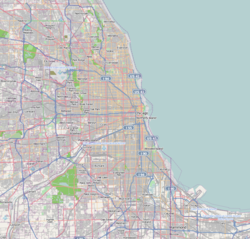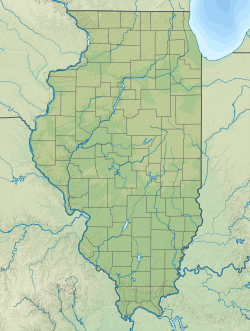Forest View, Illinois
Forest View, Illinois | |
|---|---|
 | |
 Location of Forest View in Cook County, Illinois. | |
| Coordinates: 41°48′27″N 87°47′10″W / 41.80750°N 87.78611°W | |
| Country | |
| State | Illinois |
| County | Cook |
| Township | Stickney |
| Incorporated | 1924 |
| Government | |
| • Type | Trustee-village |
| • President | Nancy L. Miller |
| Area | |
• Total | 1.29 sq mi (3.36 km2) |
| • Land | 1.17 sq mi (3.03 km2) |
| • Water | 0.13 sq mi (0.33 km2) 10.83% |
| Population (2020) | |
• Total | 792 |
| • Density | 678.08/sq mi (261.73/km2) |
| Down 10.28% from 2000 | |
| Standard of living (2007-11) | |
| • Per capita income | $26,547 |
| • Median home value | $234,900 |
| ZIP code(s) | 60402 |
| Area code(s) | 708 |
| Geocode | 26987 |
| FIPS code | 17-26987 |
| Website | http://villageofforestview.com/ |
Forest View is a village in Cook County, Illinois, United States. Per the 2020 census, the population was 792.[2] It is primarily an industrial corridor adjacent to the Chicago neighborhood of Garfield Ridge, which is on the village's southern border.
Geography
[edit]Forest View is located at 41°48′27″N 87°47′10″W / 41.80750°N 87.78611°W (41.807379, -87.786065).[3]
According to the 2021 census gazetteer files, Forest View has a total area of 1.30 square miles (3.37 km2), of which 1.17 square miles (3.03 km2) (or 90.19%) is land and 0.13 square miles (0.34 km2) (or 9.81%) is water.[4]
Demographics
[edit]| Census | Pop. | Note | %± |
|---|---|---|---|
| 1930 | 125 | — | |
| 1940 | 208 | 66.4% | |
| 1950 | 291 | 39.9% | |
| 1960 | 1,042 | 258.1% | |
| 1970 | 927 | −11.0% | |
| 1980 | 764 | −17.6% | |
| 1990 | 743 | −2.7% | |
| 2000 | 778 | 4.7% | |
| 2010 | 698 | −10.3% | |
| 2020 | 792 | 13.5% | |
| U.S. Decennial Census[5] 2010[6] 2020[7] | |||
As of the 2020 census[8] there were 792 people, 361 households, and 301 families residing in the village. The population density was 611.58 inhabitants per square mile (236.13/km2). There were 288 housing units at an average density of 222.39 per square mile (85.87/km2). The racial makeup of the village was 54.17% White, 2.02% African American, 4.42% Native American, 1.52% Asian, 0.00% Pacific Islander, 20.33% from other races, and 17.55% from two or more races. Hispanic or Latino of any race were 48.86% of the population.
There were 361 households, out of which 33.1% had children under the age of 18 living with them, 66.20% were married couples living together, 9.42% had a female householder with no husband present, and 16.62% were non-families. 14.40% of all households were made up of individuals, and 6.65% had someone living alone who was 65 years of age or older. The average household size was 4.07 and the average family size was 3.63.
The village's age distribution consisted of 31.8% under the age of 18, 4.7% from 18 to 24, 23.8% from 25 to 44, 24.7% from 45 to 64, and 15.0% who were 65 years of age or older. The median age was 37.1 years. For every 100 females, there were 105.3 males. For every 100 females age 18 and over, there were 96.7 males.
The median income for a household in the village was $97,321, and the median income for a family was $110,347. Males had a median income of $50,379 versus $46,000 for females. The per capita income for the village was $33,010. About 1.3% of families and 1.8% of the population were below the poverty line, including 0.0% of those under age 18 and 1.5% of those age 65 or over.
| Race / Ethnicity (NH = Non-Hispanic) | Pop 2000[9] | Pop 2010[6] | Pop 2020[7] | % 2000 | % 2010 | % 2020 |
|---|---|---|---|---|---|---|
| White alone (NH) | 685 | 467 | 359 | 88.05% | 66.91% | 45.33% |
| Black or African American alone (NH) | 3 | 5 | 16 | 0.39% | 0.72% | 2.02% |
| Native American or Alaska Native alone (NH) | 0 | 0 | 0 | 0.00% | 0.00% | 0.00% |
| Asian alone (NH) | 0 | 13 | 12 | 0.00% | 1.86% | 1.52% |
| Pacific Islander alone (NH) | 0 | 2 | 0 | 0.00% | 0.29% | 0.00% |
| Other race alone (NH) | 0 | 5 | 0 | 0.00% | 0.72% | 0.00% |
| Mixed race or Multiracial (NH) | 9 | 3 | 18 | 1.16% | 0.43% | 2.27% |
| Hispanic or Latino (any race) | 81 | 203 | 387 | 10.41% | 29.08% | 48.86% |
| Total | 778 | 698 | 792 | 100.00% | 100.00% | 100.00% |
Government
[edit]Forest View is in Illinois' 3rd congressional district.
Education
[edit]Forest View is served by Lyons School District 103. Grade school students attend Home Elementary School in neighboring Stickney, and George Washington Middle School in Lyons.
It is served by J. Sterling Morton High School District 201's Morton West located in Berwyn as its residential areas are west of Ridgeland Avenue.[10][11]
Transportation
[edit]Pace provides bus service on routes 307 and 311 connecting Forest View to destinations across the region.[12]
References
[edit]- ^ "2020 U.S. Gazetteer Files". United States Census Bureau. Retrieved March 15, 2022.
- ^ "Forest View village, Illinois". United States Census Bureau. Retrieved April 15, 2022.
- ^ "US Gazetteer files: 2010, 2000, and 1990". United States Census Bureau. February 12, 2011. Retrieved April 23, 2011.
- ^ "Gazetteer Files". Census.gov. United States Census Bureau. Retrieved June 29, 2022.
- ^ "Decennial Census of Population and Housing by Decades". US Census Bureau.
- ^ a b "P2 : Hispanic or Latino, and Not Hispanic or Latino by Race – 2010: DEC Redistricting Data (PL 94-171) – Forest View village, Illinois". United States Census Bureau.
- ^ a b "P2 : Hispanic or Latino, and Not Hispanic or Latino by Race – 2020: DEC Redistricting Data (PL 94-171) – Forest View village, Illinois". United States Census Bureau.
- ^ "Explore Census Data". data.census.gov. Retrieved June 28, 2022.
- ^ "P004: Hispanic or Latino, and Not Hispanic or Latino by Race – 2000: DEC Summary File 1 – Forest View village, Illinois". United States Census Bureau.
- ^ "1950s." J. Sterling Morton High School East. Retrieved on December 20, 2016.
- ^ "SCHOOL DISTRICT REFERENCE MAP (2010 CENSUS): Cook County, IL Page 4." U.S. Census Bureau. Retrieved on December 20, 2016.
- ^ "RTA System Map" (PDF). Retrieved January 31, 2024.




